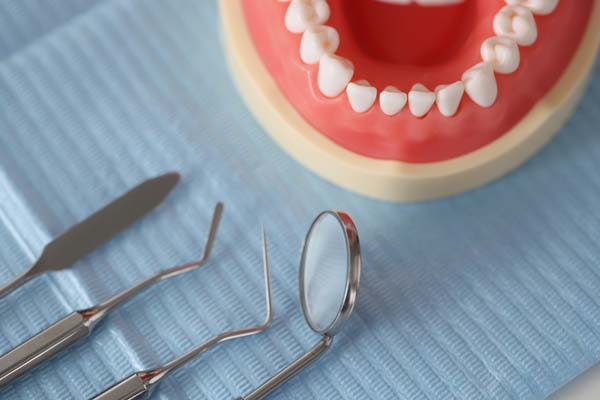Can a General Dentist Perform Oral Surgery?

The idea of oral surgery can be intimidating, especially when your dentist recommends it. It is easy to understand the extra layer of anxiety that happens when the dentist goes on to refer you to a specialist.
As you picture an unfamiliar person coming at your mouth with sharp instruments, you ask yourself: Do you really need that referral? Maybe your general dentist could just perform the oral surgery. Keep going to find out if general dentists perform oral surgery.
General dentists, oral surgeons and oral surgery
It all comes down to training and the complexity of a specific oral surgery. These are the two factors that determine if a general dentist performs a particular type of oral surgery. The complexity of any oral surgery depends on a patient’s unique set of circumstances and the nature of the procedure.
For example, a dentist can extract the wisdom tooth of one patient and refer a second wisdom tooth extraction to an oral surgeon or periodontist. It all depends on whether the problem tooth is stuck deep inside the jawbone or gum.
In contrast, complex oral surgeries like corrective jaw surgery or gum flap surgery are the preserves of dental specialists like periodontists and oral surgeons. There is little chance of a dentist performing these kinds of surgery. Reason being that dental specialists pursue years of training to acquire the skills necessary to perform certain kinds of oral surgery.
Training and oral surgery
General dentists are first-line oral health providers. They spend most of their time offering preventative care, giving diagnoses, and performing restorative procedures. Where possible, dentists will use restorations to save teeth from extraction, but they will pull teeth if they must. This describes the scope of training for a general dentist, in broad strokes.
Then there are specialists like the endodontist, the periodontist and the oral surgeon. Like general dentists, they go through four years of dental school, but they don’t stop there. They pursue training that allows them to specialize in their respective fields.
The oral surgeon goes through a surgical residency in a hospital setting, a process that takes anywhere from four to six years. The residency teaches deep and practical knowledge of the maxillofacial structures in and around the mouth.
The future oral surgeon learns about the hard and soft tissues of the mouth and lower face. This includes their structure, physiology, injury and common disorders that affect them. By the end of their residency, oral surgeons gain the diagnostic and surgical skills to treat and repair different conditions that affect the mouth and lower face.
Types of oral surgery and the dental specialists that perform them
It is now clear that some oral surgeries require a certain type of specialist, while others are easily done at the dentist’s office. Here is a summary that demonstrates the difference:
- General dentists perform simple and moderately difficult tooth extractions
- Oral surgeons perform complex extractions while periodontists remove wisdom teeth with hard or soft tissue obstruction
- General dentists perform root canals
- Endodontists, periodontists and oral surgeons perform complex root canals, especially those that require an apicoectomy
- Dentists often do scaling and root planning for patients with gum disease. So do periodontists
- Dentists that pursue continuous in-career training for dental implant surgery can gain the skill to place dental implants
- Periodontists and oral surgeons place numerous dental implants over the course of a year
This list should act as a guide that helps predict when a general dentist will refer their patient to a different dental health professional. From this list, it is easy to see that a referral ultimately depends on the patient’s diagnosis.
We focus on the long-term health of your mouth
This is the first reason why you should reach out to us. Take advantage of our dentist’s wealth of experience to learn if and how oral surgery can get you back to peak oral health.
Request an appointment here: https://kernanfamilydental.com or call Kernan Family Dental at (904) 775-4255 for an appointment in our Jacksonville office.
Check out what others are saying about our dental services on Yelp: Oral Surgery in Jacksonville, FL.
Recent Posts
Oral surgery is often necessary to remove impacted teeth. A tooth is said to be impacted if it fails to emerge fully through the gum tissues because something inhibited its eruption, such as bone, malocclusion, cysts, dense soft tissue or other teeth. This problem is common with wisdom teeth, usually because there is no longer…
Learning more about the oral surgery treatments now available for smile makeovers is something everyone should do when interested in improving the way their smile looks. There are more cosmetic dentistry options available than ever before for you to choose from, which means you have lots of options when it comes to cosmetically designing your…
If your dentures don't fit anymore or have some missing teeth, you need a denture reline to make them fit and look good again. Denture relining is the best option if you have weak or damaged teeth that cannot be used as anchors to retain your dentures. If you have natural teeth, the dentist will…
A dental crown is used to restore teeth that are in bad shape. Oftentimes, they are needed for teeth that have become cracked, chipped or broken. Additionally, general dentists recommend them for teeth that have severely decayed due to an infection. While they are one of the most common dental restorations, many wonder how long…


